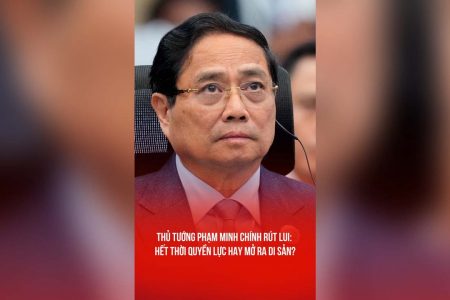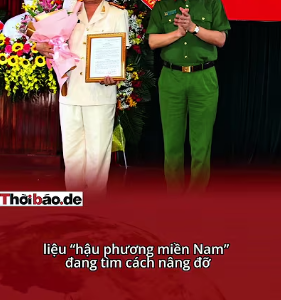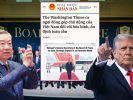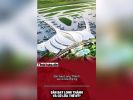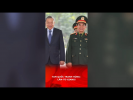
On the website „Tieng Dan“ on February 6, 2021, at the end of the article titled „The rule of law“ or „Politics is the marshal,“ author is lawyer Ngo Ngoc Trai concluded „Vietnam is on a roadmap to build a rule of law and a society that respects the law, instead of as China sees politics as a marshal. Ngo Ngoc Trai also compared Vietnam with China and „pegged“ a firm sentence: „There are many things in common between the Vietnamese and Chinese systems, but we are more fortunate that there are no factors which would lead Vietnam to wrongway like in China.”
Where to get the rule of law?
Not clear „system model“ that did lawyer Ngo Ngoc Trai mention above: politics or law, governance or institutions? What is even more ambiguous is that thanks to what factors does Vietnam „be more fortunate“ to be able to „avoid making mistakes“ like China? Maybe these issues are not really the purpose of the article of the lawyer. However, these days, all eyes of observers are focused on the „Four highest senior posts“ of Vietnam’s communist regime and the „rising star“ Pham Minh Chinh who is considered the „character of the year“ or candidate for the post Prime Minister. So let’s look back to see what direction the Party/State leadership has/will move in practice?
Let’s talk about the similarities and differences between Vietnam and China on another occasion. Here only highlight a fatal flaw of the current system that we do not have a „foundation“ to build a „rule of law state.“ „Law-abiding society“ (legal society) is even less. In Vietnam, the Communist Party of Vietnam (CPV) leads the state and society. So where do we get the rule of law when the election of the General Secretary at the 13th National Congress violates the Party’s Charter and the regulation „special cases,“ according to the assessment of lawyer Tran Quoc Thuan, former vice chairman of the National Assembly Office. Based on the duties and powers of the party member, Mr. Thuan formally petitioned the CPV’s Central Committee to have an official document that responded publicly in the press and the media why there is a self-story structure then arbitrarily through such high-level personnel!
Regarding the statement of the CPV General Secretary telling the media about the handling of „a suitcase with many millions of dollars,“ lawyerTran Quoc Thuan firmly criticized the illegal handling of the involved people. It is impossible to carry a ton of money to bribe the Central Inspection Committee, but instructed to „get back“ like that. It is clear that this is an illegal act, because the party leaders and officials of the Central Inspection Commission did not denounce the crime, from the perspective of Fatherland Front and legal society. Likewise, what kind of a system of rule of law is that the Chief Justice of the Supreme People’s Court, Mr. Nguyen Hoa Binh – who blatantly denies before the National Assembly that there are no legal miscarriages in Vietnam – was elected to the Politburo and would be promoted to the head of Central Internal Affairs Commission?

Journalist Kha Luong Ngai, former deputy editor-in-chief of Saigon Giai Phong Newspaper under the Party Committee of Ho Chi Minh City, commented: The surprise was answered by the „Law of the party“ was the head of the Party, Mr. Nguyen. Phu Trong violated, and „Law of the people, by the people, for the people“ is a kind of law only to rule over the people, to arbitrarily judge the people according to the rights and interests of the regime. So in the near future, the unjust sentences of Ho Duy Hai and Dong Tam land petitioners will surely be upheld and enforced while Mr. Nguyen Phu Trong and Mr. Nguyen Hoa Binh are still automatically sitting on fame and defiance of rules.
The remarks above of Mr. Ngai reminds us of the suppression of Dong Tam land petitioners. The individuals responsible for the crime were Nguyen Phu Trong and To Lam who tried to use power and revealed the nature of the regime, in order to create an atmosphere of „white terror“ in society. It was two decades from the begining of the 21st century, a civil economic dispute was settled by using 3 thousand riot policemen equiped with weapons of all kinds. The Dong Tam raid was a slash that cut the last link between the people and the party.
Regarding the underlying causes leading to the Dong Tam tragedy, many analyzes suggest that it will take decades for its truths to be fully revealed. But the raid had a reason without cover, which was to confirm “The law? We are the law!“ (Les lois? – C’est moi!) – is believed to be a principle from César the Great. Applying that principle, Nguyen Phu Trong wants to let people know that his stay for the third term is a historical choice. The role of „the world of action“ is foreseen even before the publication of Pham Thanh’s work, daring to publicly denounce the dictator in a totalitarian regime.
Similarly, the role of Prime Minister Pham Minh Chinh is the same. Mr. Chinh has undergone the „Four Pillars“ test from the time when he was „apprentice“ in Quang Ninh, a small province, with three projects on „Law on Special Economic Zones“ serving the interests of China. That „Law on Special Economic Zones“ has sparked a height of protest across the country. In countries ruled of law, people like Mr. Trong or Mr. Chinh have been eliminated by voters right from early rounds. In Vietnam, it’s the opposite. It is their bail for them to move up the ladder of power.
Trends leaning towards China?
The most basic principle for rule of law is that no one is allowed to stand above the law or stand outside the law, everyone must obey the law. The most important application of the rule of law is that government can only exercise its power legally under widely written and distributed laws. Rule of Law is different from and higher than rule by law in many factors. At a minimum, the State Administration must ensure three factors: i) The State is limited by law; ii) The State must have an open legal system, which is generally applied to the whole society, in which there must be a right to a fair trial; iii) The rule of law exists only in a society when people are not subjected to unpredictable abnormal behavior by any individual (whether the General Secretary or anyone else).
No institution after the 13th National Congress, from the Politburo to the Central Committee, can meet one of the above factors. Fulfilling all three factors at once is even less unlikely. Why can that be confirmed? First, as mentioned in the first part, to the Party Charter, you even ignore it, let alone „subject to the limitation by law.“ Second, how can „publicize“ and „apply generally to the whole society“ of that legal system, when the system is so pathetically blind. Third, any one of the two power institutions mentioned above, unfortunately „turned by the wind,“ the subjects (not citizens yet!) are very easy to „suffer from the unpredictable abnormal behaviors” of those members.
After the Congress, there was an assessment that the transfer of „power poles“ from the 12th term to the 13th tenure, including the „Four Pillars,“ continued to be tense until the last minute. The plan of senior personnel and „special cases“ including the position of General Secretary, only reached consensus at the 15th Plenum of the Central Committee (before the 13th Congress). In fact, many indications suggest that this is not the case. Vietnam is not „on the way to building a rule of law and a society that respects the law“ like lawyer Ngo Ngoc Trai concluded. The congress had just ended, the fight seemed to continue again. It started with the failure of newly-elected Politburo member Tran Tuan Anh to take the desire position of foreign minister currently held by senior diplomat Pham Binh Minh.
But the most cheeky judgment is probably the tingling judgment these days on websites: Between the three men in the „Four Pillars“ (Pham Minh Chinh – Nguyen Xuan Phuc – and Vuong Dinh Hue), there may be new fighting. Phuc or Hue can „kick“ Chinh down to the National Assembly seat so that either of them takes the Prime Minister’s seat. After the Politburo seemed to agree with the option that Mr. To Lam „remains“ as the Minister of Public Security, Mr. Tuan Anh was „pushed to „head of the Central Economic Commission, suddenly Mr. Phuc also expressed his intention not to „leave the Prime Minister’s post.“ Saying this judgment bold, because so is not clearly seen the „invisible hand“ of China. From Beijing, this time no high-level delegation of the Communist Party of China (CPC) visited Vietnam like the previous congresses, but everything seemed to follow a script. Seeing that enough to see „the duo“ Nguyen Phu Trong – Pham Minh Chinh have obeyed the „instruction“ from Beijing. Agreeing to keep Mr. Trong, deceive Pham Binh Minh from the Ministry of Foreign Affairs, at any cost push Pham Minh Chinh to the Prime Minister … are plans planned from the beginning.
It seems that China is the „winner“ at the 13th National Congress of CPV, and will also be the one behind the post-Congress movements. Because, Beijing has a tight grip on two core issues of Hanoi: economy and security. The increasingly volatile global upheaval caused by the Covid-19 pandemic and the growing US-China strategic competition could very well disrupt all Vietnamese plans. In fact, Vietnam’s economy is currently heavily dependent on foreign trade and investment from outside, especially from China. This dependence is growing and increasing. This, in turn, could lead to compromises on maritime and island sovereignty, especially common exploitation in the EEZs of Vietnam. In short, the tendency to lean towards China is dominated, so it is difficult to expect Vietnam to enter the stage of building a rule of law state or a law-abiding society.
Thoibao.de (Translated)
Source: https://www.rfa.org/vietnamese/news/blog/is-vn-heading-to-rule-of-law-state-02122021100950.html



